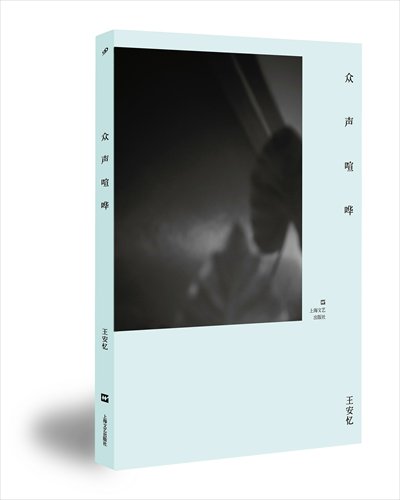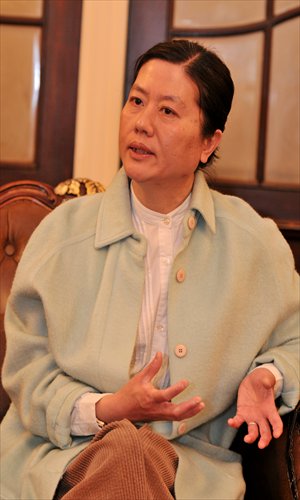Amid the uproar


Renowned author shows the way to inner peace in Shanghai
Dubbed as the "spokeswoman" for city life of Shanghai, Chinese author Wang Anyi pens lots of different characters in her writing that reflect changes of people's lives in the city as well as the city itself where Wang has spent most of her life.
As one of the best authors in China today, Wang is known for her work The Everlasting Regret, published in 1995, which later earned her the 5th Mao Dun Literature Prize, China's top literature prize, in 2000.
The book is considered a modern classic for its vivid and detailed depictions of a Shanghai girl's entire (and tragic) life from the 1940s until her death in the 1990s, through which changes of Shanghai itself also unfold before readers. Hence, the book is regarded as a modern epic of the city.
Early this month, her new book, Uproar of the Masses (non-official translation for Zhong Sheng Xuan Hua) was published. Focusing again on a group of "marginalized" people in the city, Wang tries to uncover the real meaning of life.
Hailed as the successor of Eileen Chang (1920-95) as the representative of "Haipai writers" (ones who live and write in Shanghai, known for their lyric writing style), Wang is often compared with Chang for both possessing a subtle and refined sensibility in writing about Shanghai from a female perspective.
"Though both female writers focus on Shanghai, their differences are greater than their similarities," said Xia Qi, a cultural critic, "not just because they are from different times, but their observations and feelings in the writing are also different. Wang has more easiness, calmness and unpredictable changes in her writing," said Xia.
Lesser figures
Uproar is 53,000-charater novelette, with its storyline centering on mainly three characters, Uncle Ou, Nan Nan and Liu Ye. Ou moved to Shanghai from Ningbo (in southern Zhejiang Province) when he was young and then spent all his life in the larger city as a worker in a printing factory.
Several years ago, his wife passed away and he suffered a stroke. After some time in recovery, his speech ability was still impaired. In order to relieve the burden on his children (whose economic conditions are not good), Ou opens a button shop, to make ends meet as well as remain a part of society.
Nan Nan, who is a security guard for a residential block, is a Shanghai native that grew up being spoiled and coddled by his family. He is tall and good-looking in appearance but stutters when he speaks. With both characters sharing a similar difficulty in communicating with others, Ou and Nan Nan became close friends, a pair of silent partners relying emotionally on each other through gestures, eye contact or fragmented words.
Another leading character, Liu Ye who left her child and husband in her hometown in China's northeast area, came to Shanghai following her big dream of managing a world-class clothing brand. She is energetic and articulate, but not many of her words are true.
To make a living, Liu Ye borrows part of Uncle Ou's shop to start her clothing business. But it does not go well. Her vitality and smooth tongue don't bring her any good luck. Finally her husband, a wild and violent man comes with their child to look for her and bring her home.
Bigger wisdom
Under Wang's pen, the story emphasizes the silent but special bond between Uncle Ou and Nan Nan. In the author's view, Ou is a sophisticated old man and in his quiet way, he is able to find inner peace through his humble button business. He also helps Nan Nan, a young man easily disturbed about life's little ups and downs, to learn to stay calm and find peace.
For example, whenever Nan Nan gets upset, Ou always tells him to count the number of buttons in his shop, one by one. "The bond between those two characters is like what we know in an old saying: 'Silence means more than words at this very moment,'" said Du Han, copy editor of Uproar.
The character Liu Ye establishes a strong contrast to the two men's relationship. In the story, Uncle Ou also suggests that she count buttons when she is upset, but she refuses. Though always energetic and talkative, she seems never to be able to find inner peace.
"The living wisdom of Uncle Ou is what the author admires through writing," said Du, "and his special bond with Nan Nan is a poetic and mutual warming for each other, which is hardly sought after in a noisy and compressing big city," she told Global Times.
Just as Wang herself commented, "It's those marginalized people that my works are concerned about." In her view, those people, though they are not part of mainstream life (pursuing material wealth in the big city), are living in a very poetic way. "Instead, those big bosses wearing neat suits and looking decent, are more like robots," said Wang.
"In the story, Uncle Ou finds his peace by counting his buttons. I do it by writing," she added.
The fourth character
When it comes to writing about people in a city, the city itself also becomes a focus. Though regularly centering on Shanghai, Wang's works never feature modern things like skyscrapers, large bridges or eye-catching global events like the Shanghai World Expo 2010.
"Only 'small' characters have aesthetic value," said Wang. Declining local Shanghai residents, vibrant nonnative out-of-towners all enter her sight.
In another of Wang's works, The Cobbler (2010), Wang also concentrated on a group of out-of-towners working from the bottom of society that are gradually edged out by local people.
"Pure Shanghainese accent has basically disappeared in the downtown areas," said Wang, "in Uproar of the Masses, Uncle Ou is an out-of-towner. They are becoming the new life force of the city; real natives are declining (in influence)."
"This novel also underlines the process of how a city refreshes its composition," she added.